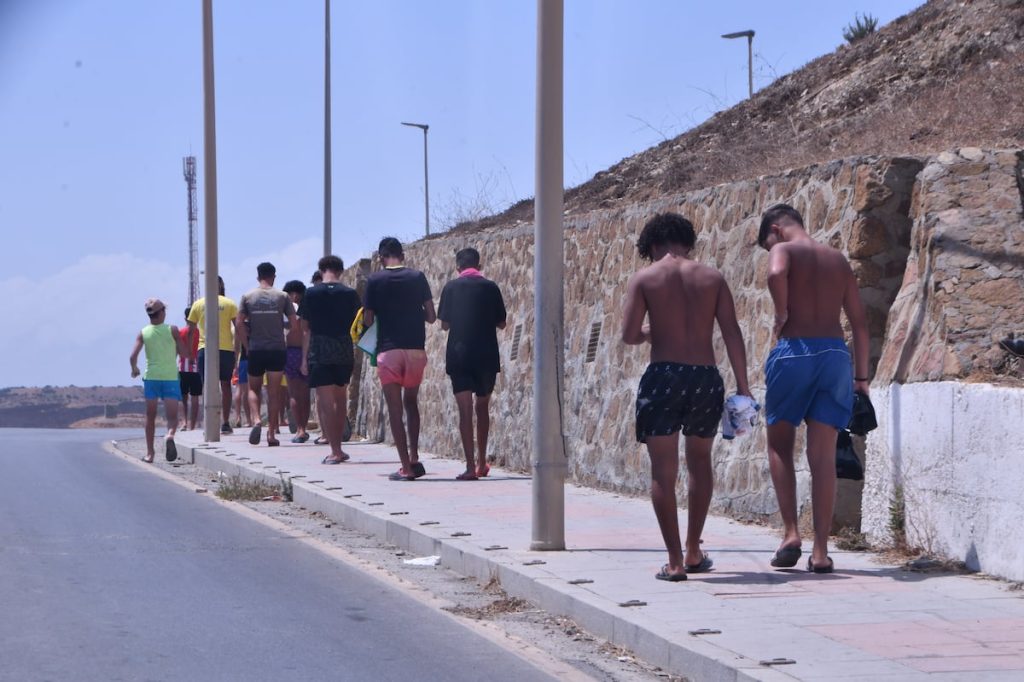The sustained entry of underage migrants into Ceuta over the past five days has prompted the Government of the autonomous city to hold an extraordinary meeting on Thursday to address a situation they consider “unsustainable” and that is stretching their resources to the limit. After the meeting, led by President Juan Jesús Vivas (PP), a new request for assistance has been made to the Government and the autonomous communities to find a solution to quickly and obligatorily transfer these children and adolescents to the mainland. Ceuta currently has 406 minors under its care, approaching one of its highest figures recorded in 2019 when 470 young migrants were attended to. The arrivals of minors by swimming from Morocco have been consistent over the past five days, with around twenty arriving each night, except for Wednesday when only three youths entered Spanish territory. The autonomous city experienced a similar concerning situation back in February when 150 minors arrived in 42 days, prompting the preparation of new facilities in case of a crisis like the one being experienced now. These shelters are currently housing mainly Moroccan migrant boys, with a relatively calm profile, according to municipal sources.
Despite the plea for help from the Ceuta Government due to their inability to accommodate such a large number of minors under appropriate conditions, the situation in the autonomous city on Thursday was similar to any coastal town on August 15th. Among the tourists enjoying their vacation or families eating paella, the young migrants strolled out to the beach with their towels, accompanied by their monitors. During the extraordinary meeting of the Ceuta Government that lasted over three hours and interrupted the vacation of some attendees, the head of the Local Police confirmed that the situation in the city was normal, as per municipal sources. The Government of the autonomous city is transferring the latest arrivals to an emergency reception facility located in a former warehouse in the Tarajal industrial estate. This area, near the border, had previously housed migrants after the mass entry of 10,000 people in May 2021. The place, which has recently been set up, has been adapted for this use and offers substantially better conditions compared to the facilities used to accommodate minors three years ago, as highlighted by municipal sources. Additionally, Ceuta has four new facilities for migrants, explains Gaitán.
These 400 migrant minors hosted in the city triple the capacity for 130 people that corresponds to the municipality of 19.5 square kilometers and 83,000 inhabitants. The number of minor arrivals this year is six times higher than in 2023, according to the Ceuta Government, noting that the city is currently hosting five of these children and adolescents for every 1,000 inhabitants, while the national average does not reach 0.001 per 1,000. Vivas announced that he would send a letter to the Prime Minister, Pedro Sánchez, the Ministers of Territorial Policy and Children and Youth, Ángel Víctor Torres and Sira Rego, and the regional presidents demanding a “suitable, responsible, solidary, and efficient” response from the State that includes legal and budgetary mechanisms to transfer the minors.
In July, the President expressed his support for changing the immigration law to require all autonomous communities to accommodate migrant minors arriving in territories such as Ceuta, Melilla, and the Canary Islands, contrary to his party’s position. The proposal did not pass in Congress due to the opposition of the PP, Junts, and Vox. Following this setback, Ceuta is awaiting the contingency plan approved in the Sectorial Conference a month ago, which establishes quotas for the transfer of minors from Ceuta and the Canary Islands to other autonomous communities. Ceuta is expected to relocate 87 minors to other regions, and while the transfers have begun, the process is slow, according to the Minister of the Presidency. Given the significantly increased pace of youth arrivals in Ceuta in recent days, there is a pressing need for assistance from the Government and the autonomous communities.


